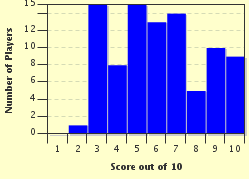Quiz Answer Key and Fun Facts
1. The British "turret" fighter, also known as "Daffy", redeemed itself (well to some extent at least) as a night fighter, after turning out to be a dismal failure in daylight operations. Which of these was it?
2. Like a Phoenix from the ashes of the failed Avro Manchester, arose the mainstay of the RAF bomber command, sinking the German battleship "Tirpitz" on its way to fame. I am talking about the?
3. In 1936 Focke Wulff introduced the Fw-61. It was one of the world's first practical and functional _______ .
4. The first American jet fighter flew in October 1942, but was not well received by the US forces and as such never saw combat. This aircraft was the ...?
5. On 10 December 1941 the HMS Repulse and HMS Prince of Wales were hit and sunk by torpedoes released from a Japanese aircraft. Amongst the attackers was Type 1, "Betty" aircraft.
6. Due to the nature of the conflict, the Soviets relied heavily on light bombers. One aircraft in their staple became the best Soviet build light tactical bomber of the war with production exceeding 11,400 units. It was the?
7. This twin engined aircraft became one of the most versatile of the war, earning the nickname "Mädchen fur alles" (Maid of all work). It served as a dive bomber, tactical bomber, night fighter, torpedo bomber, heavy fighter and even as a flying bomb. Which of these am I referring to?
8. Which twin engined light bomber, designed by Frank Barnwell, had an association with Sir Winston Churchill?
9. The B-29 that dropped the bomb on Hiroshima was the "Enola Gay". What was the name of the plane that dropped "Fat Man" on Nagasaki?
10. To end, one of those unbelievable truths from the battlefield. A B-17 bomber was involved in a mid-air collision with a enemy fighter on 1 February 1943 over Tunisia. An historic photograph was taken of the stricken plane as it limped home. The name of this legendary aircraft was the ...?
Source: Author
MrRadt
This quiz was reviewed by FunTrivia editor
bloomsby before going online.
Any errors found in FunTrivia content are routinely corrected through our feedback system.

